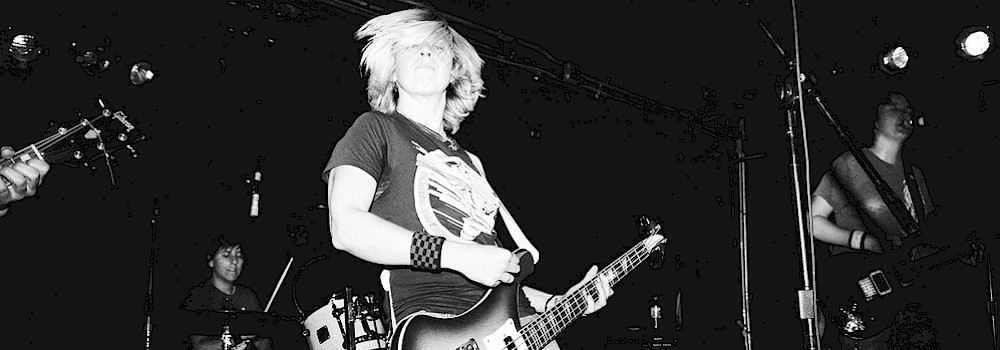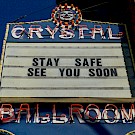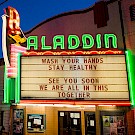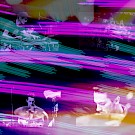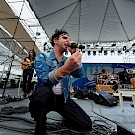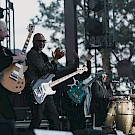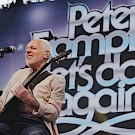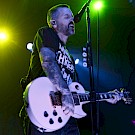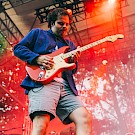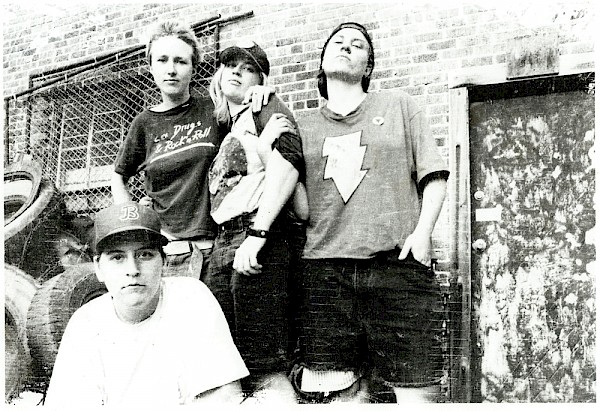 Team Dresch circa 1994 during their 'Personal Best' era with Marcéo Martinez, Jody Bleyle, Donna Dresch and Kaia Wilson: Photo by Margarita LaPussygata / Lead photo by Erik Gamlem: Martinez, Dresch and Bleyle at D.C.’s storied Black Cat in 2007Trying to get a straight answer out of Team Dresch on any subject is an entertaining challenge. Ask a question about the experience of touring in the ’90s as the nucleus of a growing queercore scene and you won’t hear about powerful shows or impactful moments with tourmates like Bikini Kill. They’d much rather talk about the early GPS device they had that would lead them to the nearest Taco Bell or how they used to steal long-distance calls from payphones.
Team Dresch circa 1994 during their 'Personal Best' era with Marcéo Martinez, Jody Bleyle, Donna Dresch and Kaia Wilson: Photo by Margarita LaPussygata / Lead photo by Erik Gamlem: Martinez, Dresch and Bleyle at D.C.’s storied Black Cat in 2007Trying to get a straight answer out of Team Dresch on any subject is an entertaining challenge. Ask a question about the experience of touring in the ’90s as the nucleus of a growing queercore scene and you won’t hear about powerful shows or impactful moments with tourmates like Bikini Kill. They’d much rather talk about the early GPS device they had that would lead them to the nearest Taco Bell or how they used to steal long-distance calls from payphones.
“I always laugh at our conversations because they go off to some other level,” says Donna Dresch, the band’s guitarist, bassist and namesake. “And we very rarely come back.”
Singer and guitarist Kaia Wilson immediately agrees. “We tangent off the rails.”
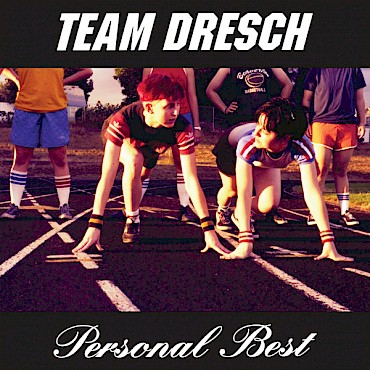 Team Dresch will re-release their first LP 'Personal Best' via Jealous Butcher Records on May 31 along with their sophomore album and debut seven-inch 'Hand Grenade + 2' via Kill Rock Stars—celebrate Pride weekend with them at Mississippi Studios on June 14 and 15There’s a lot to talk about: the upcoming reissues of the band’s two studio albums—1995’s Personal Best and 1996’s Captain My Captain—as well as new material they are recording and tours they are planning. But when they get together, even if it’s just three out of the four members of the group sitting around a corner table at North Portland’s The Red Fox on a rainy Monday, Wilson, Dresch and drummer Marcéo Martinez slip immediately into a conversational comfort zone. (Singer, guitarist and bassist Jody Bleyle was at home with her family.) They cut each other off and talk over each other, veering off and around any topic while dropping inside jokes and playful jabs along the way.
Team Dresch will re-release their first LP 'Personal Best' via Jealous Butcher Records on May 31 along with their sophomore album and debut seven-inch 'Hand Grenade + 2' via Kill Rock Stars—celebrate Pride weekend with them at Mississippi Studios on June 14 and 15There’s a lot to talk about: the upcoming reissues of the band’s two studio albums—1995’s Personal Best and 1996’s Captain My Captain—as well as new material they are recording and tours they are planning. But when they get together, even if it’s just three out of the four members of the group sitting around a corner table at North Portland’s The Red Fox on a rainy Monday, Wilson, Dresch and drummer Marcéo Martinez slip immediately into a conversational comfort zone. (Singer, guitarist and bassist Jody Bleyle was at home with her family.) They cut each other off and talk over each other, veering off and around any topic while dropping inside jokes and playful jabs along the way.
It’s a discursive byproduct of a friendship that has been going on for the better part of three decades, well before they started making music together and long after the original lineup of the band imploded in 1997. Besides, Team Dresch has long saved its most direct messages and blunt responses to the world for the group’s fiery and dynamic music.
For an all-too-brief moment in the late ’90s, it seemed like they, alongside groups like The Need and The Third Sex, could help knock Portland out of its post-grunge malaise and carry forward the energy and intensity of the Riot Grrrl movement. The discourse they stirred up remained but nearly all of the groups carrying that torch fizzled out.
Team Dresch, though, never fully vanished. Different permutations of the group survived for appearances on a few seven-inch singles through the ’90s. And since 2004 when the original lineup of the band played a triumphant set at the Homo A Go Go fest in Olympia, Wash., they’ve popped up for occasional live performances, most recently selling out two post-election shows in 2017 at Mississippi Studios.
With all four members of the group busy with their personal lives, day jobs and other musical projects, what inspired them to turn up the heat on this project again?
“Rob asked us,” Dresch says, laughing, referring to Rob Jones, the man behind Jealous Butcher Records, the label reissuing their albums as well as a collection of the band’s singles, seven-inches and compilation appearances. “Every so often we get together and play and have been thinking about writing new songs anyway. And with the 25th anniversary of us being a band coming up, Rob was just like, ‘Let me do it,’ and we were like, ‘Okay!’”
It’s a modest answer but one that speaks to just how different the cultural landscape looks today compared to when Dresch and her bandmates entered into the punk and indie rock scenes in the late ’80s and early ’90s. When Team Dresch was getting underway, the state was still reeling from the efforts of the Oregon Citizens Alliance, which attempted to add language to the state constitution that “recognizes homosexuality... as abnormal, wrong, unnatural and perverse.” Today, Oregon’s governor is openly bisexual and same-sex marriage is the law of the land. Not to discount the dangers that the LGBTQ community is facing thanks to the current administration, but the fact that Team Dresch can sound so casual about slipping back into the modern music scene speaks volumes about how much easier it is for them to move through the world.
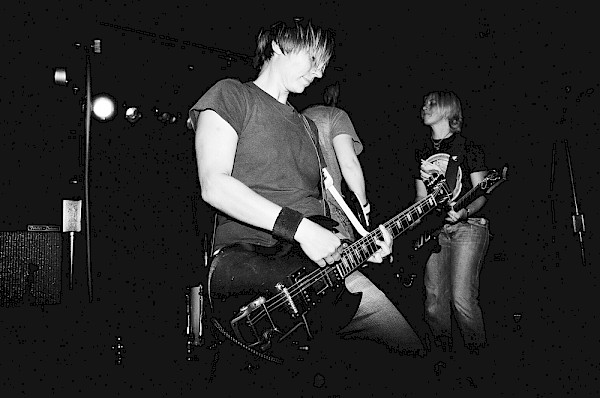 Wilson at D.C.’s storied Black Cat in 2007: Photo by Erik GamlemThirty years ago, when the members of Team Dresch first started making contact with one another, it was a much different story. In those heady pre-World Wide Web days, the connection that young people who fell in the LGBTQ spectrum sought with other queer kids was often relegated to the occasional punk show and through fanzines, like Chainsaw, the one Dresch published and that inspired Wilson to start corresponding with her future bandmate.
Wilson at D.C.’s storied Black Cat in 2007: Photo by Erik GamlemThirty years ago, when the members of Team Dresch first started making contact with one another, it was a much different story. In those heady pre-World Wide Web days, the connection that young people who fell in the LGBTQ spectrum sought with other queer kids was often relegated to the occasional punk show and through fanzines, like Chainsaw, the one Dresch published and that inspired Wilson to start corresponding with her future bandmate.
“I was in high school in rural Oregon outside Springfield,” Wilson remembers, “writing actual fucking letters to Donna when I was 16. I was like, ‘I’m writing a gay letter! To a gay woman!’ That’s basically what it said. Then, she wrote me back! I wrote like 20 pages and she wrote back the raddest simplification of it all like, ‘You’re on this. It’s going to be okay.’”
“Like, it gets better?” Martinez offers.
“More like, it gets gayer,” Wilson retorts. “It definitely gets gayer.”
By the time they all landed in Portland, all four were active members of the underground music scene. Dresch and Bleyle were the known quantities as the former, slightly older than the rest of her Team Dresch bandmates, had toured with Dinosaur Jr. and briefly joined Screaming Trees while the latter was drumming and singing in Hazel. Martinez, at the time, was playing drums for noise-rockers Calamity Jane and Wilson was fronting the flint-edged Adickdid. Still, the LGBTQ punk scene was small enough that they crossed paths frequently.
“Jody found me after a Calamity Jane show,” Martinez says. “I was like, ‘Oh my god, this person’s hyper,’ but she was like, ‘You’re gay!!’ But we were all magnetized and starving for that community.”
That feeling was clearly not isolated to Portland. When Team Dresch recorded and released a seven-inch through Kill Rock Stars in 1994 (which is also receiving the remaster and reissue treatment this May), the band was immediately embraced by equally hungry fans, which allowed them to book their first nationwide tour and found them getting positive write-ups in Rolling Stone. Buoyed by this enthusiasm and each others’ company, they didn’t let up off the accelerator for the next three years.
“It was boom, we hit the ground running and we’re gone,” Martinez says.
“We were like that T-shirt art we had with Mariel Hemingway hurdling,” Wilson adds, referencing the early ’80s track and field movie Personal Best, to which their debut record pays homage. “None of us could do that but we had the will. I think we could have all hurt ourselves from trying but we would have tried so hard.”
What came out of that flurry of activity was a pair of albums that have not lost one iota of their power and emotion. Equal parts proto-metal and agit-punk, the songs cut through the bullshit with clean, steady strokes. The personal and political bleed together with Wilson’s memories of falling for a fundamentalist Christian girl (“When I was 16, she said to me, you have a demon possession”) sitting astride tunes that expressed real fears of getting arrested for walking down the street holding hands with their girlfriends.
 The 'Captain My Captain' era with Bleyle, Wilson, Dresch and Melissa York: Photo by Tammy Rae CarlandThe intensity of the period was also Team Dresch’s initial undoing. Early on, Bleyle and Dresch were a couple, adding an extra layer of tension to long drives between tour stops. Martinez jumped ship between albums, unable to keep up with the pace of activity and the interpersonal drama, replaced by ex-Vitapup drummer Melissa York. By the time they were done touring in support of Captain My Captain, they had a big blow up that no one in the group likes to talk about in any detail. But it was bad enough that Wilson and York both left for North Carolina, starting a new band, The Butchies, when they arrived.
The 'Captain My Captain' era with Bleyle, Wilson, Dresch and Melissa York: Photo by Tammy Rae CarlandThe intensity of the period was also Team Dresch’s initial undoing. Early on, Bleyle and Dresch were a couple, adding an extra layer of tension to long drives between tour stops. Martinez jumped ship between albums, unable to keep up with the pace of activity and the interpersonal drama, replaced by ex-Vitapup drummer Melissa York. By the time they were done touring in support of Captain My Captain, they had a big blow up that no one in the group likes to talk about in any detail. But it was bad enough that Wilson and York both left for North Carolina, starting a new band, The Butchies, when they arrived.
The fences now mended, Team Dresch has, again, been slowly making its collective way back together. Not just to practice for shows, but simply to reconnect and keep their friendships alive. The general feeling was: If new songs get written, great, but there’s no need to force them.
What the members of the band have also been slowly reckoning with is the impact that they’ve had on a generation of listeners who heard in Team Dresch an echo of their own experiences as young queers. That was hardly their intention when they started making music together in 1994, but they appreciate the impression they’ve clearly left and are gearing up to recast in 2019.
“I have a buddy at work who grabbed me by the shoulder after they read an article about us,” Martinez says. “They were saying, ‘Oh my god, you were the band that we had to look to.’ Even that,” the fact that Team Dresch were—and continue to be—a voice for many marginalized fans, “I had no idea. But it’s still obviously very important.”

